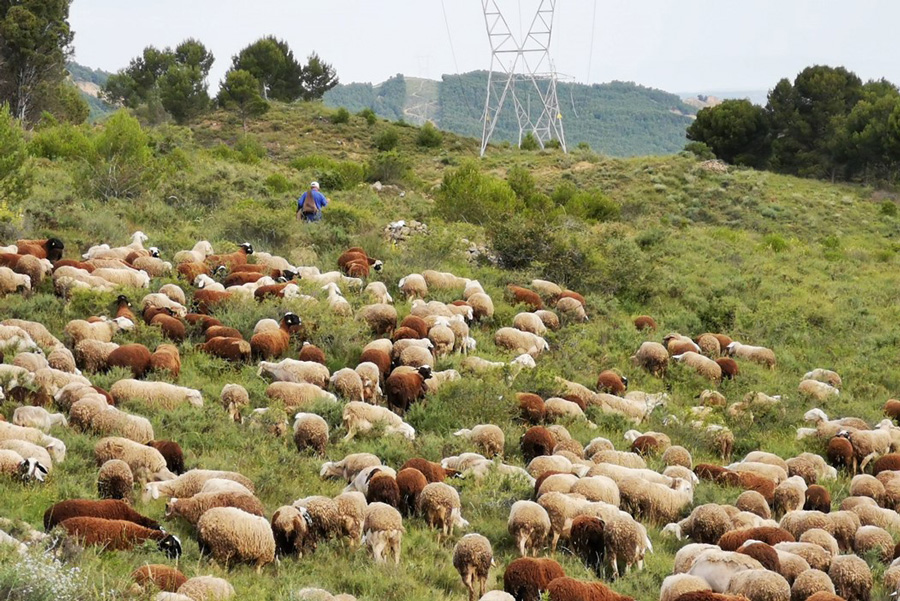Resilient landscapes. Two approaches – mobile pastoralism and land stewardship – merge tradition with modern sustainability to protect biodiversity, enhance climate resilience, and support livelihoods. ResAlliance highlights these nature-based solutions as key for Mediterranean ecosystems.

For thousands of years, pastoralism has shaped Mediterranean forests, where grazing livestock maintains ecological balance and biodiversity. Shepherds, as ‘managers of high-value environmental territories’, ensure the sustainability of these landscapes, yet their role is often undervalued. With land abandonment and climate change intensifying wildfire risks, mobile pastoralism provides a natural fire prevention method. Livestock reduces dry vegetation, creating firebreaks and maintaining habitat diversity. There are various forms of mobile pastoralism, including transhumance and nomadic pastoralism. A well-known example is the tradition of transhumance in the Iberian Peninsula, where domestic herbivores trace ancient routes inherited from their wild predecessors. Migratory routes act as ecological corridors that facilitate seed dispersal and connect valuable habitats, including protected areas, semi-natural landscapes, and natural habitats. When animals no longer consume biomass, it remains untouched, increasing the risk of fires.

Beyond fire prevention, pastoralism enhances soil health. Grazing cycles organic matter, improving soil structure, water retention, and carbon sequestration. However, challenges such as land fragmentation, restrictive policies, and declining pastoralist communities threaten its future. Addressing these issues requires policy support, economic incentives, and market access to make pastoralism attractive to younger generations.
An interesting example of a private-public partnership is Network Grazing, or Pastoreo en RED, developed by Red Eléctrica de España (REE) in 2021-2022. This project used extensive grazing under high-voltage lines in the region of La Rioja as an alternative to mechanical vegetation control. The initiative reduced wildfire risk, improved soil quality, and provided economic incentives for farmers by compensating them for the ecosystem services their livestock help provide.
The revival of this sustainable land management is becoming increasingly relevant in the face of climate uncertainty – and there are many opportunities to revalue this traditional practice.
Reviving traditional farming: the land stewardship approach
Menorca, like many other Mediterranean islands, faces economic pressures that have led to the abandonment of traditional farming practices, while others increasingly pursue intensive methods for short-term economic gain. These shifts pose significant cultural, socio-economic, and environmental challenges to the island’s ecosystems. In response, the Balearic Group of Ornithology and Defence (GOB) has initiated the Land Stewardship Scheme, Custodia Agraria in Catalan. This initiative aims to support agricultural activities that conserve nature. It serves as an example of collaboration among environmental NGOs, farmers, public officials, and consumers, all working together to restore the health and resilience of the Mediterranean landscape and preserve the mosaic landscape identity that Menorca has safeguarded for millennia.

This scheme is fostering sustainable farming through voluntary agreements between farmers and conservation organisations. Participants commit to wildlife conservation, organic practices, and rotational grazing in exchange for technical support and market access. GOB Menorca actively promotes their products to local and broader markets, fostering awareness and demand for locally produced, sustainably sourced food.
Increased farmer involvement will contribute to preserving traditional farming practices and local varieties of crops and livestock, which are integral elements of Menorca’s cultural heritage. This, in turn, will help combat biodiversity loss and create more resilient territories.
Both mobile pastoralism and land stewardship emphasise the importance of traditional knowledge in ecological resilience. Supporting these practices through policy, economic incentives, and community engagement can ensure the sustainability of Mediterranean landscapes. The ResAlliance project continues to advocate for these solutions, preserving the region’s natural heritage for future generations.
Discover more agricultural best practices
Visit ResAlliance’s official website
This article was originally written by:
IUCN Centre for Mediterranean Cooperation
The post Enhancing territorial resilience: mobile pastoralism and land stewardship appeared first on Resilience Blog.